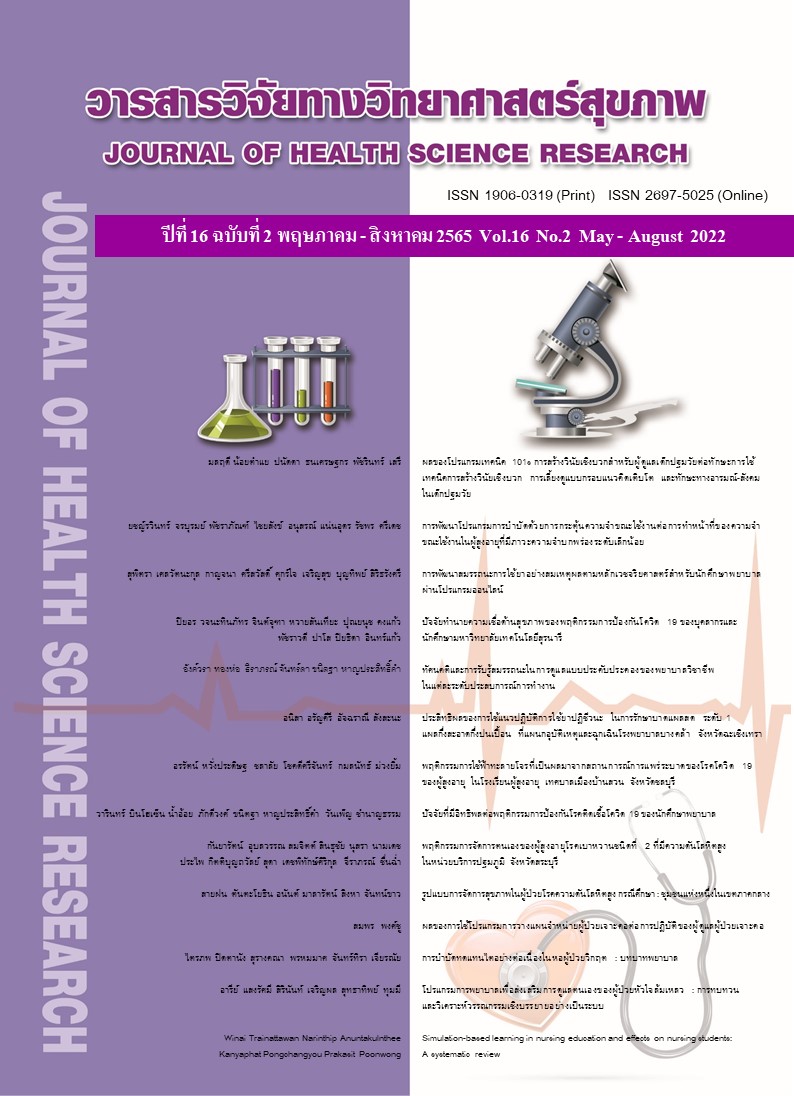การพัฒนาโปรแกรมการบำบัดด้วยการกระตุ้นความจำขณะใช้งาน ต่อการทำหน้าที่ของความจำขณะใช้งานในผู้สูงอายุ ที่มีภาวะความจำบกพร่องระดับเล็กน้อย
Main Article Content
บทคัดย่อ
บทนำ : การพัฒนาโปรแกรมการบำบัดด้วยการกระตุ้นความจำขณะใช้งานเป็นวิธีการช่วยให้ผู้สูงอายุที่มีภาวะความจำบกพร่องระดับเล็กน้อยสามารถชะลอความเสื่อมถอยของสมองได้อย่างมีประสิทธิภาพ
วัตถุประสงค์การวิจัย : เพื่อพัฒนาและเปรียบเทียบผลของโปรแกรมการบำบัดด้วยการกระตุ้นความจำขณะใช้งานต่อการทำหน้าที่ของความจำขณะใช้งานในผู้สูงอายุที่มีภาวะความจำบกพร่องระดับเล็กน้อยวิธีการวิจัย : เป็นการวิจัยและพัฒนา ดังนี้ 1) กำหนดปัญหา และสำรวจความต้องการ เนื้อหา และกิจกรรมที่ต้องการพัฒนา 2) การออกแบบสร้างและตรวจสอบ การประเมินความเป็นไปได้และการยอมรับโปรแกรมการบำบัดด้วยการกระตุ้นความจำขณะใช้งาน และ 3) ทดสอบผลลัพธ์ของโปรแกรมการบำบัดด้วยการกระตุ้นการรู้คิด เลือกตัวอย่างแบบเฉพาะเจาะจง จำนวนตัวอย่าง 78 คน วิเคราะห์ข้อมูลโดยใช้สถิติเชิงพรรณนา สถิติทดสอบวิลคอกซัน และแมนวิทเนย์ยู
ผลการวิจัย : พบว่า 1) โปรแกรมการบำบัดด้วยการกระตุ้นความจำขณะใช้งาน ได้รับการยอมรับและมีความเป็นไปได้ที่จะนำไปใช้ในชุมชนในระดับมากที่สุด (M=4.56, SD=0.60) 2) กลุ่มทดลองมีคะแนนความจำขณะใช้งานในผู้สูงอายุที่มีภาวะความจำบกพร่องระดับเล็กน้อย เพิ่มขึ้นกว่าก่อนทดลอง (Mean Rank=26.20) อย่างมีนัยสำคัญทางสถิติ (p<.001) และ มีค่าคะแนนความจำ (Mean Rank=28.55) สูงกว่ากลุ่มที่ได้รับการให้คำปรึกษาแบบสั้น (Mean Rank=16.95) อย่างมีนัยสำคัญทางสถิติ (p<.001)
สรุปผล : จากข้อค้นพบนี้ชี้ให้เห็นว่าโปรแกรมการบำบัดด้วยการกระตุ้นการรู้คิด สามารถนำไปใช้กับผู้สูงอายุที่มีภาวะความจำบกพร่องระดับเล็กน้อยได้
Downloads
Article Details

อนุญาตภายใต้เงื่อนไข Creative Commons Attribution-NonCommercial-NoDerivatives 4.0 International License.
บทความที่ได้รับการตีพิมพ์เป็นลิขสิทธิ์ของวิทยาลัยพยาบาลบรมราชชนนี จังหวัดนนทบุรี
ข้อความที่ปรากฏในบทความแต่ละเรื่องในวารสารวิชาการเล่มนี้เป็นความคิดเห็นส่วนตัวของผู้เขียนแต่ละท่านไม่เกี่ยวข้องกับวิทยาลัยพยาบาลบรมราชชนนี จังหวัดนนทบุรี และคณาจารย์ท่านอื่น ในวิทยาลัยฯ แต่อย่างใด ความรับผิดชอบองค์ประกอบทั้งหมดของบทความแต่ละเรื่องเป็นของผู้เขียนแต่ละท่าน หากมีความผิดพลาดใด ๆ ผู้เขียนแต่ละท่านจะรับผิดชอบบทความของตนเองแต่ผู้เดียว
เอกสารอ้างอิง
Senanarong V, Harmphadungkit K, Poungvarin N, Vannasaeng S, Chongwisal S, Chakorn T, et al. The dementia and disability project in Thai elderly: rational, design, methodology and early results. BMC Neurology. 2013;13(3):1-11. doi: 10. 1186/1471-2377-13-3.
Kaduszhiewicz H, Eisele M, Proken J, Luppa M, Luck T, Bickel H,et al. Prognosis of mild cognitive impairment in general practice: result of the German Age CoDE study. Ann Fam Med. 2014;12(2):158-65. doi: 10.1370/afm.1596.
American Psychiatric Association. Diagnostic and statistical manual of mental disorders. fifth edition, Washington, DC: American Psychiatric Association; 2018.
Julsiri A, Chadcham S. Improving working memory in elderly. Journal of nursing and education. 2014;7(1):16-25. (in Thai).
Baddeley A. The episodic buffer: A new component of working memory? Trends Cogn Sci. 2000;4(11):417-23. doi: 10.1016/ s1364-6613(00)01538-2.
Baddeley AD. Developing the concept of working memory: The role of neuropsychology1. Arch Clin Neuropsychol. 2021;36(6):861-73. doi: 10.1093/arclin/acab060.
Lawrence K, Rubin M. Keep your brain alive: 83 neurobic exercises to help prevent memory loss and increase mental fitness. University Medical Center, Durham, North Carolina; 1998.
Phuangwarin N. Thai geriatric depression scale: TGDS. Siriraj Medical Journal. 1994;46(1):1-9. (in Thai).
Institute of Geriatric Medicine, Department of Medical Services, Ministry of Public Health. Dementia test Thai version (MMSE-Thai); 1999. (in Thai).
Kang H. Sample size determination and power analysis using the G*Power software. J Educ Eval Health Prof. 2021; 18:17. doi: 10.3352/jeehp.2021.18.17.
Hemrungrojn S. MoCA Thai Version. [Internet]. 2007 [cited 2021 Jul 15]; Avaliable from http://www.mocatest.org. (in Thai).
Panngm W, Kraithawot P,Wanggpitipanit S. A survey of experimental research on cognitive training program in older adults with mild cognitive impairment and older adults with dementia. Royal Thai Navy Medical Journal. 2020;47(1):56-76. (in Thai).
Ophey A, Roheger M, Folkerts AK, Skoetz N, Kalbe E. A systematic review on predictors of working memory training responsiveness in healthy older adults: methodological challenges and future directions. Front Aging Neurosci. 2020;12:575804. doi:10.3389/fnagi. 2020.575804.
Al Mahmud A, Slikboer R, Stargatt J, Bhar S. Computer-based cognitive interventions for mild cognitive impairment and dementia in older adults: protocol for a systematic review of published studies and meta-analysis. Syst Rev. 2019;8(1):231. doi: 10.1186/s136 43-019-1146-x.
Wongjan J, Leethong-in M, Piyawattanapong S. Impact of Brain exercise program on older adults’ cognition. Journal of Thailand Nursing and Midwifery Council. 2020;35(2):70-84. (in Thai).
Wu J, Ma Y, Ren Z. Rehabilitative effects of virtual reality technology for mild cognitive impairment: A systematic review with meta-analysis. Front Psychol. 2020; 11:1811. doi: 10.3389/fpsyg.2020.01811.
Momeni M, Arab M, Dehghan M, Ahmadinejad M. The effect of foot massage on the level of consciousness and delirium of intensive care patients: A randomized single-blind controlled trial. J Bodyw Mov Ther. 2021;27:48-54. doi: 10.1016/j.jbmt.2021.03.008.
Uewongtrakul J, Kornpetpanee S, Kaewkaen P. Enhancing working memory in the elderly with massage program by applying the theory of ten primary energy lines combined with Chinese Acupressure. Research Methodology and Cognitive Science. 2019;16(2):189-206. (in Thai).
Division of Alternative Medicine Department of Thai Traditional and Alternative Medicine
Ministry of Public Health. Manual foot reflexology (foot reflexology) for elderly health. 2nd print. Nonthaburi: We Indy Design; 2019. (in Thai).
Bennett RH, Bolling DZ, Anderson LC, Pelphrey KA, Kaiser MD. fNIRS detects temporal lobe response to affective touch. Soc Cogn Affect Neurosci. 2014;9(4):470-6. doi: 10.1093/scan/nst008.
Kansri J, Yotthongdi N, Booranarek S. The effects of the brain exercise program applying neurobic exercise theory on depression among older adults with mild cognitive impairment. Journal of Boromarajonani College of Nursing, Bangkok. 2018;34(3):65-76. (in Thai).
Wanpahul D. The development of a brain fitness training program to increase short-term memory in the elderly an event-related brain potentials study. Journal of Rajanagarindra. 2016;13(30):51-61. (in Thai).
Yong L, Liu L, Ding T, Yang G, Su H, Wang J, et al. Evidence of effect of aerobic exercise on cognitive intervention in older adults with mild cognitive impairment. Front Psychiatry. 2021;12:713671. doi: 10.3389/fpsyt.2021.713671.
Nakawiro D, Chansirikarn S, Srisuwan P, Aebthaisong O, Sudsakorn P, Vidhyachak C, et al. Group-based training of executive function, attention, memory and visuospatial function (Team-V) in patients with mild neurocognitive disorder. Journal Psychiatric Association Thailand. 2017;62(4):337-48. (in Thai).


